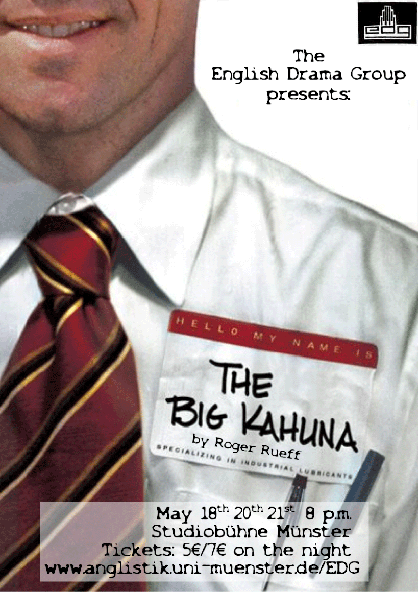
The Big Kahuna
A Play By Roger Rueff
The English Drama Group’s coming play, Roger Rueff’s The Big Kahuna, is a brave endeavor relying as it does on only three characters, which gives the piece a very claustrophobic, intense feel. The play is directed by Iris Adamzick, veteran of the EDG and student of theater arts. The three actors, Hermann Fischer, Björn Mattsson and Richard Pollex, are also experienced EDG actors. Together they are appearing for the first time as the English Drama Group Extra.
There are two religions in America, one spiritual, one secular. The first worships in churches, the second at business conventions. The Big Kahuna is about an uneasy confrontation between these two systems of faith.
The play is a kind of Depths of a Salesman or Waiting for Kahuna. Three marketing representatives are ensconced in a low-rent hospitality suite in “exciting” Wichita, Kansas (“the operative word was suite, hospitality suite, not hospitality closet!”) and are in search of the Big Kahuna, the great white whale, the businessman who with one tiny ejaculation of sound will make or break the careers of these corporate shills.
The 3 characters are as different from each other as can be and represent different stages of life and development. Bob is the callow youth, the born-again Baptist, the first-timer who is at his first business convention. His motivation is his religious zeal. He is so certain of his religious beliefs that he is disdainful of all non-believers. He still has to learn what his place in the universe is and it is his unbending beliefs that lead to the showdown at the end of the play.
Larry is the cocksure salesman who wavers between shallow cynicism and complete honesty. He’s the man who tells big businessmen that they are nothing more than a “goddamn, cock-sucking liar from the word go” and is attracted to women in business suits. Fearful of his ultimate fate, he cannot handle the missionary in Bob. Their ultimate clash is predestined.
Phil is the marketing rep who has reached a point in his life where his next step is crucial to his existence. Undergoing a painful divorce, he is almost at the end of the line. But despite his inner turmoil he possesses a great well of humanity, and it is this which makes him the moral center of the play.
This blend of characters is ultimately very volatile and can only end in an explosive epiphany when Bob lets his religion do his talking. The play consists of a series of scenes with the characters meshing and colliding. It is both funny and touching, ludicrous and real.
Final question: Is it possible to swim with the sharks and still be a fisher of men?

